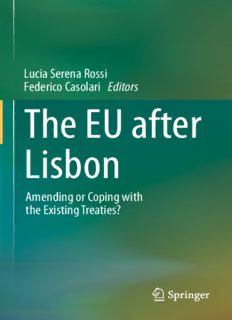
The EU after Lisbon: Amending or Coping with the Existing Treaties? PDF
Preview The EU after Lisbon: Amending or Coping with the Existing Treaties?
Lucia Serena Rossi Federico Casolari Editors The EU after Lisbon Amending or Coping with the Existing Treaties? The EU after Lisbon ThiSisaFMBlankPage Lucia Serena Rossi (cid:129) Federico Casolari Editors The EU after Lisbon Amending or Coping with the Existing Treaties? Editors LuciaSerenaRossi FedericoCasolari DepartmentofLegalStudies AlmaMaterStudiorum- UniversityofBologna Bologna,Italy With the support of the Lifelong Learning Programme of the European Union, ProjectNo177316–LLP–1–2010–DE–ERASMUS–ENWA. Thispublicationreflectstheviewsonlyoftheauthors,andtheEuropeanCommis- sioncannotbeheldresponsibleforanyusewhichmaybemadeoftheinformation containedherein. ISBN978-3-319-04590-0 ISBN978-3-319-04591-7(eBook) DOI10.1007/978-3-319-04591-7 SpringerChamHeidelbergNewYorkDordrechtLondon LibraryofCongressControlNumber:2014942073 ©SpringerInternationalPublishingSwitzerland2014 Thisworkissubjecttocopyright.AllrightsarereservedbythePublisher,whetherthewholeorpart of the material is concerned, specifically the rights of translation, reprinting, reuse of illustrations, recitation,broadcasting,reproductiononmicrofilmsorinanyotherphysicalway,andtransmissionor informationstorageandretrieval,electronicadaptation,computersoftware,orbysimilarordissimilar methodologynowknownorhereafterdeveloped.Exemptedfromthislegalreservationarebriefexcerpts inconnectionwithreviewsorscholarlyanalysisormaterialsuppliedspecificallyforthepurposeofbeing enteredandexecutedonacomputersystem,forexclusiveusebythepurchaserofthework.Duplication ofthispublicationorpartsthereofispermittedonlyundertheprovisionsoftheCopyrightLawofthe Publisher’s location, in its current version, and permission for use must always be obtained from Springer.PermissionsforusemaybeobtainedthroughRightsLinkattheCopyrightClearanceCenter. ViolationsareliabletoprosecutionundertherespectiveCopyrightLaw. The use of general descriptive names, registered names, trademarks, service marks, etc. in this publicationdoesnotimply,evenintheabsenceofaspecificstatement,thatsuchnamesareexempt fromtherelevantprotectivelawsandregulationsandthereforefreeforgeneraluse. While the advice and information in this book are believed to be true and accurate at the date of publication,neithertheauthorsnortheeditorsnorthepublishercanacceptanylegalresponsibilityfor anyerrorsoromissionsthatmaybemade.Thepublishermakesnowarranty,expressorimplied,with respecttothematerialcontainedherein. Printedonacid-freepaper SpringerispartofSpringerScience+BusinessMedia(www.springer.com) Preface and Acknowledgments Thisvolumeistheresultofaresearchprojectonthequasi-constitutionalnatureof theLisbonTreaty,aprojectbegun3yearsagowithintheframeworkoftheErasmus Academic Network LISBOAN (Linking Interdisciplinary Integration Studies by BroadeningtheEuropeanAcademicNetwork).Theresearchwasaimed,ontheone hand,atofferingabetterunderstandingofthenatureoftheLisbonTreatyand,on theother,atinvestigatingthewayinwhichtheTreatyaddressestheconstitutional pluralismcharacterizingtheEuropeanintegrationprocess. Inthisvolume,thoseinvestigationsarecarriedastepfurtherthroughafocuson the central question of whether the EU Treaties need further revising. On 1 December 2013, it was 4 years to the day since the Lisbon Treaty had come into force, following the debacle of the Treaty establishing a Constitution for Europe.Inwelcomingitsentryintoforce,thepresidentoftheEuropeanCommis- sion, Jose´ Manuel Barroso, enthusiastically declared, ‘I’m delighted that we now havetherightinstitutionstoactandaperiodofstability,sothatwecanfocusallour energy on delivering what matters to our citizens.’1 However, all too regrettably, thesituationthatdevelopedonthegroundimmediatelythereaftertookadramatic turn away from that scenario: the eurozone debt crisis—coupled with some other majorevents,notleastofwhichtheproblemstheinstitutionsoftheEuropeanUnion (EU)havefacedinensuringtheenforcementoftheruleoflaw(withthe2010Roma crisis in France, the ongoing Hungarian crisis of 2011, and the 2012 Romanian crisis)—shaped an environment that made it difficult, at the very least, to fully implement the Lisbon Treaty’s reform. At the same time, those events, and the broaderpost-Lisbonpractice,havebroughttolightsomemajorinadequaciesofthe currentlegalframeworkinthefaceofthechallengesconfrontingtheUnion. Is that enough to advocate a further comprehensive reform of the Treaties? Should a new reform introduce only some major innovations? Or again, adapting themostfamouslinefromGiuseppeTomasidiLampedusa’snovelTheLeopard— 1Doc.‘EuropeanCommissionwelcomestheentryintoforceoftheTreatyofLisbon’,IP/09/1855, 1December2009. v vi PrefaceandAcknowledgments ‘If we want things to stay as they are, things will have to change’—should the currentlegalframeworkbeleftsubstantiallyunchanged? The editors and authors of this volume intend to address these questions in an open-endedfashion,withoutsettingoutacommitment toanydefinitive solutions. Inthe spirit ofthat premise, thevolume has been divided into four parts. Part I— collectingChaps.1–5,byRossi,Besselink,Luif,McDonnell,andCasolari—takesa horizontalapproachtotheTreaties’ revision.WhileChap.1developsthetheoret- icalframeworkwithinwhichtoconsiderreformingtheEUTreaties,Chaps.2–5lay emphasison the parameters ofconstitutional development; the allocationof com- petencesbetweentheUnionanditsMemberStates;andtheprinciplesofsolidarity, flexibility, and loyal cooperation. These constitutional features—‘lying between’ theEUanditsMemberStates—showthemselvestobeparticularlysuitablewhenit comes to assessing the tensions between the EU institutional framework and die Herren der Vertra€ge (the Masters of the Treaties), and hence the fault lines generated by the tectonics of the EU lithosphere. Special attention is devoted in thisrespecttotheeurocrisisanditsimpactontheEU’sconstitutionaldesign. In Part II (Chaps. 6–8) the focus shifts to the question of fundamental rights within the EU’s constitutional framework. As is well known, one of the most relevant innovations of the Lisbon Treaty lies in its incorporating the Charter of Fundamental Rights into the Union’s primary law. The chapters collected in this part—by Jacque´, Van Elsuwege, and Di Federico—take up three main issues relative to the Charter’s application (the interpretation of the Charter’s horizontal provisions, reverse discrimination, and cross-border healthcare) so as to assess whether the new mechanism for protecting fundamental rights is effective and whether(andwhat)furtheractioniscalledfor. PartIII(Chaps.9–11)isdevotedtoanotherdomainsignificantlyreshapedbythe Lisbon reform, namely, the Union’s external dimension. Chapter 9 (Wouters and Ramopoulos)framesthequestionthroughanoverallassessmentofthepost-Lisbon constitutional design of EU external relations, and the remaining two chapters (Gatti and Comelli) look at some of the most relevant innovations in that domain (namely, the establishment of aEuropean External Action Serviceand the formal recognition of the European Neighbourhood Policy as a formal strand of the Union’s external action) sketching out possible avenues for dealing with the problemsandinconsistenciesdetectedinthecurrentsystem. Part IV (Chap. 12) presents some general conclusions on the topic. In the conclusions Advocate General Paolo Mengozzi highlights the common themes emerging from the various contributions, stressing the need for a more general supranationalapproachtothepoliticalcrisistheUnionisgoingthrough. The bulk of the chapters in this volume are based on papers presented at a roundtableandaworkshopheldon14and15November2012,respectively,atthe Bologna University Department of Legal Studies. The roundtable (The European UnionandtheCrisis:AmendingorJustCompletingtheLisbonTreaty)wasmade possibleby funding from the EuropeanCommission under the Ad Personam Jean MonnetChair‘TheImpactoftheLisbonTreatyonEuropeanIntegration’,whilethe workshop(TheEUaftertheLisbonTreaty:AQuasi-ConstitutionalFrameworkto PrefaceandAcknowledgments vii BeRevised?)wasorganizedaspartoftheLISBOANnetwork.Thedebatethattook place during these two events greatly contributed to the reworking and the finali- zationofthecontributionsinthisvolume. The editors wish to thank all the chairs and speakers who took part in these events—including Thomas Christiansen, Sir Francis Jacobs, Marc Maresceau, LaurentPech, andMiguel Poiares Maduro—fortheir invaluable contribution.We aredeeplygratefultoPaoloMengozzi,whoagreedtowritetheconclusionstothis volume.WealsooweadebtofgratitudetoTobiasKunsteinforhisprecioussupport at all stages of the LISBOAN research on the quasi-constitutional nature of the LisbonTreaty,toOrianaMazzolaforherassistanceinorganizingthetwoBologna events, and to Filippo Valente for his support in preparing and revising the manuscript. Bologna,Italy LuciaSerenaRossi October2013 FedericoCasolari ThiSisaFMBlankPage Abbreviations ACP African,CaribbeanandPacificGroupofStates AFSJ AreaofFreedom,SecurityandJustice BVerfGE Bundesverfassungsgericht(GermanFederalConstitutionalCourt) CEECs CentralandEasternEuropeanCountries CFI CourtofFirstInstanceoftheEuropeanUnion(nowGeneralCourt) CFSP CommonForeignSecurityPolicy COREPER CommitteeofPermanentRepresentatives CRS CrisisResponseSystem CSDP CommonSecurityandDefencePolicy CSOs Civil-SocietyOrganizations DCFTAs DeepandComprehensiveFreeTradeAreas DCI DevelopmentCooperationInstrument DGECHO Directorate-GeneralforHumanitarianAidandCivilProtection DGRELEX Directorate-GeneralforExternalRelations EAFRD EuropeanAgriculturalFundforRuralDevelopment EAGF EuropeanAgriculturalGuaranteeFund EaP EasternPartnership EBRD EuropeanBankforReconstructionandDevelopment EC EuropeanCommunity ECB EuropeanCentralBank ECHR EuropeanConventiononHumanRights ECJ EuropeanCourtofJustice ECOWAS EconomicCommunityofWestAfricanStates ECR EuropeanCourtReports ECSC EuropeanCoalandSteelCommunity ECtHR EuropeanCourtofHumanRights EDF EuropeanDevelopmentFund EEA EuropeanEconomicArea EEAS EuropeanExternalActionService EEC EuropeanEconomicCommunity EFSF EuropeanFinancialStabilityFacility ix
Description: